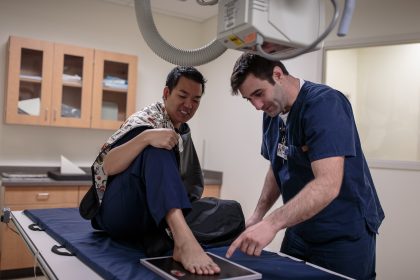 |
The program will resume accepting new applications starting from Spring 2026, and from then on, new applications will be accepted annually.
The mission of the Radiologic Science Program at Merritt College is to prepare qualified practitioners for competency in the art and science of diagnostic medical imaging. The goals of the program are:
- Students will be clinically competent.
- Students will demonstrate effective communication skills.
- Students will develop critical thinking and problem-solving skills.
- Students will demonstrate professionalism.
Radiologic Technologists manipulate sophisticated technical equipment and computers to obtain detailed images of the human body. These images assist physicians in the diagnosis of injury and disease in the clinical environment. Radiologic Technologists work in hospitals, clinics, imaging centers, and physician’s offices. A successful and competent Radiologic Technologist is one who works well as a team member, thinks critically, solves problems creatively, possesses strong technical skills, and cares for patients with sensitivity and compassion. The technologist must be flexible and able to work with patients from diverse cultural backgrounds with various needs, abilities, injuries, and disease processes. The program’s student learning outcomes focus on developing these important characteristics in program graduates.
Radiologic Science Program Learning Outcomes
Upon completion of the program graduates will be able to:
- Produce diagnostic quality medical images in a competent, safe, and compassionate manner for all basic radiography examinations in a hospital work environment.
- Communicate effectively with patients by taking appropriate histories, giving clear instructions, and providing information as needed.
- Communicate in a professional manner with hospital staff, instructors, and peers.
- Exercise critical thinking and problem-solving skills by adapting radiologic procedures to individual patient needs and conditions.
- Establish and maintain satisfactory professional relationships with other members of the health care team.
- Function as an effective health care team member by providing services in a manner that complements those performed by other team members.
- Demonstrate a commitment to professional development.
RADIOLOGIC SCIENCE COURSES
Joint Review Committee on Education in Radiologic Technology: The accreditation agency for educational programs in imaging science. Info on accreditation standards, accreditation process, and accredited schools. You may also view Merritt College Radiologic Science Program statistics including job placement rate, program completion rate, and ARRT exam pass rate by visiting this website: www.jrcert.org



